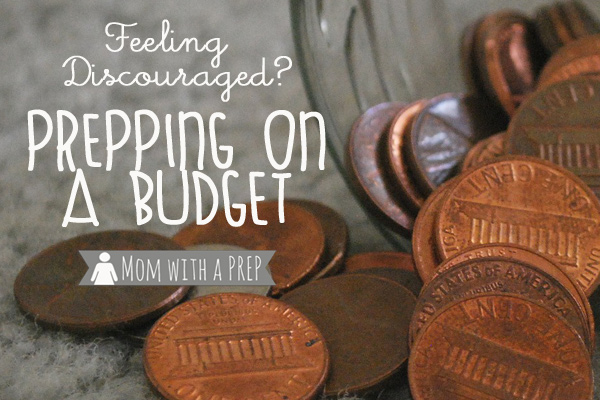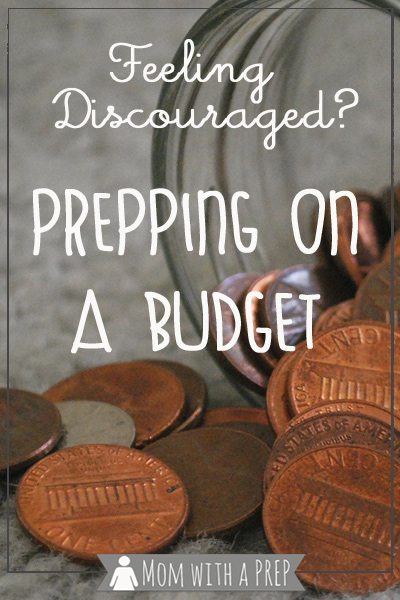Today, I am feeling discouraged. We are relatively new to preparedness and self-reliance with a lot of back stories that prevent us from being able to prep as quickly or as fully as we’d like to be able to do. Fundamentally we just don’t have enough money at the end of the month to get what we think we need in the quality we think we need it, and it’s hard to not settle on lesser quality, but we sometimes have to.

Why to Start Prepping Even on a Budget
Case in point – recently we hit up a dollar store to take advantage of some good medicine prices to stock up the medical pantry and our first aid kits. While there, I began thinking of other things we needed for our Bug Out Bags, etc. So I grabbed a few pieces of equipment (Rule #1, don’t use the dollar stores to stock your equipment). Number one on the list was can openers. For $4, I could stock both of our bug-out bags and car kits with no problem at all.
Move on to checking said car kit two months later, and the can opener was bent – the very part that is typically safeguarded by the gear mechanism, the part that is vital to actually cutting open the can, yes, that part was bent. And to bend it back just made things worse. So now I’ve wasted $4 on equipment that isn’t reliable which is money that could have gone into something reliable.
Folks try to encourage those of us who are building our food storage and emergency gear on severe budgets and getting very late starts by saying, “but at least you have this, it’s better than nothing.” Then all I can think is…but if it really goes down, this is all we have – and it’s not enough – not nearly enough. So I get discouraged that we didn’t start sooner, we made bad choices that we don’t have enough now to help, etc.
Do Not Get Discouraged!
I’m not really sure why I’m sharing, especially after I tried to encourage you to not get overwhelmed a few posts ago, but I wanted to share that it IS discouraging on some days, and you just have to push through. $20 in a week to buy extra food or batteries or needed supplies when you have a daunting list ahead of you is hard. You have so much you NEED to buy, but so little to buy it with – so here’s an idea. Learn. (and I’m speaking to myself louder than to all of you!)
You can get $20 to buy more water..but what are some other things that can help you prepare that you don’t have to spend money (and by the way, doomsday overspending is as rampant amongst preppers as clothing overspending amongst fashionistas.) to help you feel you are better preparing your family?
HOW TO BETTER PREPARE WHEN ON A BUDGET
Learn a new skill. There are tons of videos on youtube on learning skills. Begin to study how to garden or how to can or how to sew or first aid or whatever else is a skill you think you would be good at, would be useful for you and study. You can get free books to read up on at the library, read books free online, join a local club, buddy up with a friend, etc.
Organize – is your house ready? Is there clutter you could remove or sell or donate that will make your prepping more organized, easier to move around the house, and allow you to have room and less stress?
Repurpose – think of those things you might ordinarily get rid of and visualize them used in a different way. Can they further your preparedness goals?
Get in shape – This is something that every single one of us can work on. Even if you’re in decent shape, could you not do more to increase your strength or endurance? Those of us woefully out of shape would be doing ourselves a huge favor to begin to eat more healthily, begin moving, and focus on building our endurance and losing that weight. Sure, it’s hard, but in the long run, it’s the #1 prep you can do for yourself and your family – even without food and water at home, you can walk to get someplace to find it if you are in better shape than you are now.
Practice – have a skill you already know but are rusty at it? Practice.
Barter – why not barter some of your time and expertise or muscles to someone in need of some jobs done, and get something you need in exchange. If they have extra wood and you volunteer to cut it, ask for a percentage to take home. If you are great at accounting and someone has some supplies to trade, trade some of your time and expertise to get something you need that you may not have money for in the meantime.
Garden – this is one of the least expensive prepping things you can begin now. Sure, there is a little investment, but it’s easy to start small and build as you go. Don’t have much money? Do container gardening with some vegetables or herbs that you use all the time. This will save you money later in not buying those items at the store. It’s good exercise for you and your family, and it helps you learn more self-sufficiency skills in the long run.
Cut Back – if you are truly serious about prepping, cut back. Do you buy a soda? Why – it’s horrible for your body, wasteful, and money that could be better spent on other prep supplies. Then splurge on a soda on a rare occasion as a treat. The same goes for any item or food in your life that is wasteful.
There are so many other ways to go about this, but those are a few things that really come to mind to kick me off the discouragement track and get back to work.
What to Do Today When Prepping On a Budget
Begin an emergency binder – get those emergency phone numbers you grabbed a few weeks ago and put them in a binder. Don’t have the money for a binder today? Make a folder out of a paper bag that you can paper clip everything into for the time being and store someplace safe.
Take Inventory – you might find that you have so much more available to you than you realized! That camping equipment that’s been sitting in a back corner waiting for the day you might take up camping? Pull it out, clean it up, check it out – you’ve got a good start on shelter! The sleeping bags are worn? Do some quick repair work, sew a sleeping bag insert with flannel or fleece for next to nothing, and you’re good!
Water – this is an EASY fix. Store as much water as you can with available containers. If you drink soda (begin using those soda bottles for some short-term water storage, after cleaning and sterilizing them, of course). Even if you just can some with those canning jars you keep collecting and don’t use? Fill them with water and stick them in the back of your pantry until you can come up with a solution that works even better for you.
Now, can you think of some other ways you can make it happen without spending money?

Katy Willis is a writer, lifelong homesteader, and master herbalist, master gardener, and canine nutritionist. Katy is a preparedness expert and modern homesteader practicing everyday preparedness, sustainability, and a holistic lifestyle.
She knows how important it is to be prepared for whatever life throws at you, because you just never know what's coming. And preparedness helps you give your family the best chance to thrive in any situation.
Katy is passionate about living naturally, growing food, keeping livestock, foraging, and making and using herbal remedies. Katy is an experienced herbalist and a member of the CMA (Complementary Medical Association).
Her preparedness skills go beyond just being "ready", she's ready to survive the initial disaster, and thrive afterward, too. She grows 100% organic food on roughly 15 acres and raises goats, chickens, and ducks. She also lovingly tends her orchard, where she grows many different fruit trees. And, because she likes to know exactly what she's feeding her family, she's a seasoned from-scratch cook and gluten-free baker.
Katy teaches foraging and environmental education classes, too, including self-sufficient living, modern homesteading, seed saving, and organic vegetable gardening.
Katy helps others learn forgotten skills, including basic survival skills and self-reliance.
She's been published on sites such as MSN, Angi, Home Advisor, Family Handyman, Wealth of Geeks, Readers Digest, and more.
